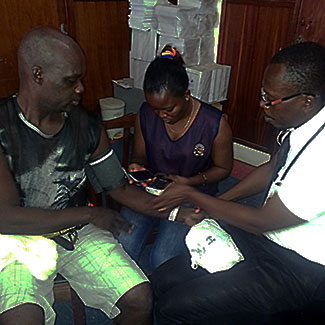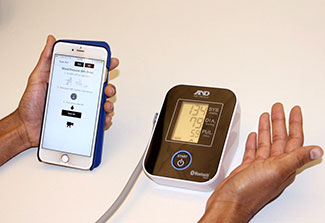NIH funds research network to reduce stroke in Africa
November / December 2016 | Volume 15, Number 6

Photo by Nathaniel Adusei
An NIH-funded study is providing participants with blood
pressure monitoring tools and other low-cost interventions
to see if they reduce stroke in sub-Saharan Africa.
Whether treating patients in his native Nigeria, caring for poor Hispanic and African-American residents of Los Angeles or serving disadvantaged populations in South Carolina, neurologist Dr. Bruce Ovbiagele finds they share a common problem - a growing risk for stroke.
The second highest cause of death globally, the disease is particularly devastating in developing countries where 86 percent of stroke deaths occur, according to the WHO. Sub-Saharan Africa bears the greatest burden of stroke, and is least equipped in terms of knowledge, infrastructure, skills and medical personnel needed to prevent and treat the disease.
"I've always had a passion for improving neurological care in sub-Saharan Africa," says Ovbiagele, a professor and neurology chair at the Medical University of South Carolina in Charleston. "Initially, I planned to go back to Nigeria after completing my training in the U.S. But I discovered I had great research partners in Africa, and collaborating with them has allowed me to continue my work here in the U.S., while helping to build human capital and research capacity in Africa."
Since 2012, Ovbiagele has used NIH support to weave a tapestry of programs to examine how to prevent and treat stroke in sub-Saharan Africa, and develop a network of U.S. and African scientists to study their populations' shared genetic risks for the disease.
Reducing subsequent strokes
In one project, Ovbiagele is collaborating with colleagues in four Nigerian hospitals to formulate and test a multi-pronged approach to reduce the likelihood that stroke patients will have a repeat event. Funded by the NIH's National Institute of Neurological Disorders and Stroke (NINDS), the effort focuses on reducing high blood pressure - a significant risk factor for stroke and the easiest one to address.
Ovbiagele and his team consulted with caregivers and patients to devise effective, culturally adapted health care delivery programs to reduce the incidence and consequences of stroke. The interventions include an instructional video that is played in clinic waiting rooms to increase stroke awareness, as well as a patient "report card" to track information such as blood pressure, cholesterol, weight, diet, exercise and other factors. To help ensure patients keep appointments, take medication and continue healthy behavior, they are sent regular text messages in English or the local Yoruba language. Finally, patients are tracked in an electronic registry.
The combination intervention will lower blood pressure readings and reduce stroke risk for the more than 300 participants in the 12-month study, Ovbiagele predicts. Such results would demonstrate the program is an economical and effective method of providing post-stroke care, and a scalable model that could be implemented in other low-resource settings.
Studying task shifting
Across sub-Saharan Africa there is a shortage of professionals with expertise in stroke, with an average of only .04 neurologists per 100,000 people. That means task-shifting responsibilities to health care workers with lower levels of education is essential, Ovbiagele says.
With support from NINDS and Fogarty, he's overseeing a project to train nurses and other health workers in Ghana to see how mobile health technology can help prevent a second stroke. This is critical, Ovbiagele notes, because having had one stroke is the greatest predictor another one will occur.

Photo courtesy of Dr. Bruce Ovbiagele
Scientists are studying mobile health solutions to determine
if text messages and remote blood pressure monitoring can
reduce stroke in Africa, where there are few neurologists.
In an initial study, Ghanaians who recently suffered a stroke were taught to use a portable wireless device to take blood pressure readings at home, and then send them by smartphone to U.S. researchers in Charleston. The scientists checked the readings and conveyed advice back to nurses in Ghana, specifying follow-up instructions for each patient. The nurses then transmitted culturally appropriate text messages to patients, reminding them to take their hypertension medication or encouraging them if they were effectively managing their blood pressure. Sixty patients in the feasibility study were randomly assigned to the mobile option or standard clinical care.
Over a 6-month period, participants using remote monitoring showed nearly a 90 percent reduction in blood pressure compared to a 20 percent dip in those receiving standard care. The results will inform refinements that will be tested in a second phase.
In addition to providing evidence regarding treatment outcomes, the project also intends to produce a cadre of Ghanaian investigators knowledgeable about clinical research methodology and experienced in executing innovative stroke research that is tailored for the local culture and setting.
Determining genetic and environmental factors
Strokes occur as a result of several complex and interacting biological processes caused by various genetic and environmental factors, making it difficult to determine if the underlying causes in Africa - where little stroke research has been done - are the same as on other continents.
To try to shed light on this issue, Ovbiagele is helping to lead the largest epidemiological study ever undertaken about stroke in Africa. Part of the NIH's Human Heredity and Health in Africa (H3Africa) initiative, researchers on both sides of the Atlantic are working together to identify unique environmental and genetic risk factors for stroke among populations of African descent. Studies will take place at eight sites in three countries: Nigeria, Ghana and South Africa.
One project is comparing Nigerian and Ghanaian stroke patients with a large cohort of African Americans to try to determine why, in spite of their similar genetic profiles, the two groups have very different risks for stroke.
"We want to determine if the risk is so much lower among Africans, compared to African Americans, because of environmental factors or if Africans' stroke risk will rise as the continent goes through an epidemiological transition - where lifestyles change and many infectious diseases are being brought under control, which means more sub-Saharan Africans are living longer and are getting to the point where they suffer noncommunicable diseases like stroke," says Ovbiagele.
Outcomes from research conducted in Nigeria - the most populous black nation on earth - are readily generalizable to people of African descent everywhere, who as a group are more likely than other populations to experience hypertension and its complications, he adds.
An earlier comparison of black and white stroke patients in the U.S., Canada and Scotland showed blacks are 60 percent more likely to experience another stroke, Ovbiagele reported in a recent journal article. Risk factors - such as hypertension, diabetes and smoking - were more prevalent in the black patients, he found.
The H3Africa project will also support the collection and banking of genomic material and data, as well as enable Ovbiagele and his colleagues to plan for future large population studies. As in all his efforts, training plays a critical role and includes building scientific capacity in genomics, biobanking, biostatistics and other related topics
The research network is funded by the National Human Genome Research Institute and NINDS through an award to the University of Ibadan, with research partners located in other Nigerian universities, Ghana and South Carolina.
Determining the role of HIV in stroke
Two out of three individuals living with HIV worldwide reside in sub-Saharan Africa. While antiretroviral therapy (ART) has helped many of them stay alive, they are at greater risk of cardiovascular disease, scientists have discovered. With a newly funded Fogarty grant, Ovbiagele will conduct a study comparing several hundred Ghanaians receiving ART with a similar number of those who are not infected. He says he hopes to learn more about medical and lifestyle risk factors, as well as those related to HIV.
The results of this and other studies led by Ovbiagele could play an important role in reducing the human and financial impact of stroke throughout Africa.
"The high cost of caring for a stroke patient can inflict serious economic damage on the individual and country in Africa, where incomes are low," Ovbiagele says. "Ultimately, we think our research outcomes will help us convince decision-makers that it's worth investing in these programs for the long term."
More Information
- Stroke information
from the National Institute of Neurological Disorders and Stroke (NINDS)
- The top 10 causes of death fact sheet (stroke is second leading cause)
from the World Health Organization
- About NIH's Human Heredity and Health in Africa initiative (H3Africa)
- About NIH's National Human Genome Research Institute
- NINDS-funded studies led by Dr. Bruce Ovbiagele:
- Related publications:
- The burden of stroke in Africa: a glance at the present and a glimpse into the future
Cardiovascular Journal of Africa supplement, March/April 2015
- Publications related to the Phone-based Intervention under Nurse Guidance after Stroke (PINGS) grant:
- Publications related to the Stroke Investigative Research and Education Network (SIREN) grant:
- Gaps in Hypertension Guidelines in Low- and Middle-Income Versus High-Income Countries, Hypertension. October 3, 2016
- Neurogenomics in Africa: Perspectives, progress, possibilities and priorities
Journal of the Neurological Sciences, July 15, 2016
- Stroke Investigative Research and Education Network: Community Engagement and Outreach Within Phenomics Core
Health Education & Behavior, April 2016
- Stroke genomics in people of African ancestry: charting new paths
Cardiovascular Journal of Africa supplement, March/April 2015
- Neurogenomics in Africa: Perspectives, progress, possibilities and priorities
Journal of the Neurological Sciences, July 15, 2016
To view Adobe PDF files,
download current, free accessible plug-ins from Adobe's website.